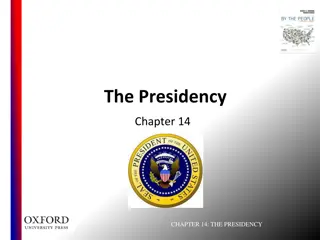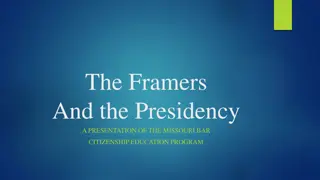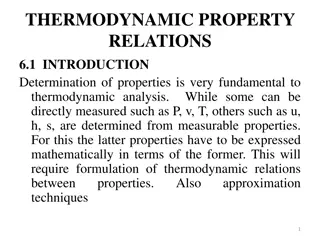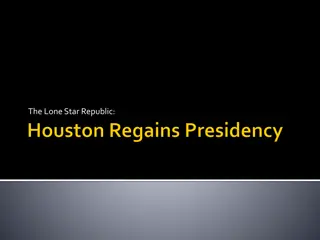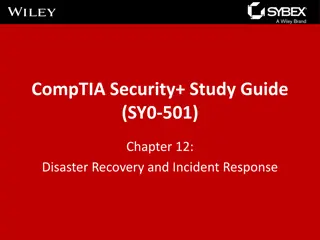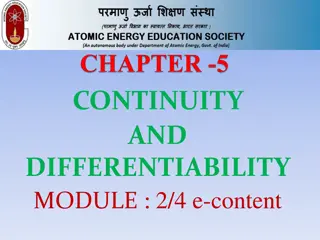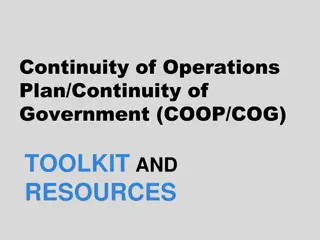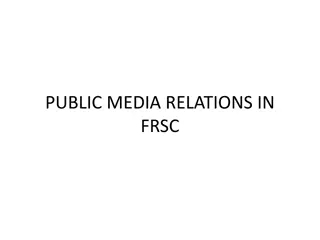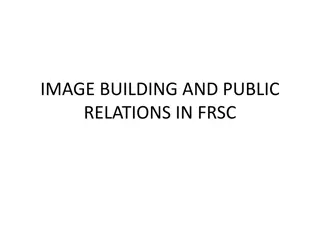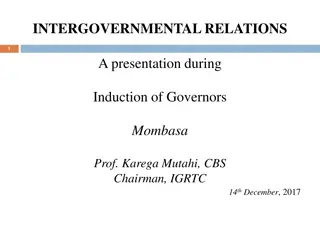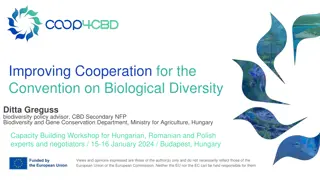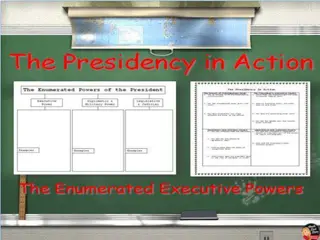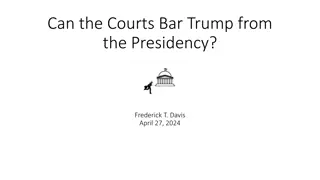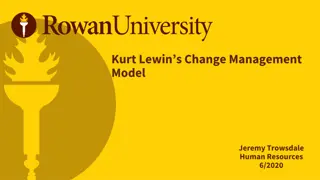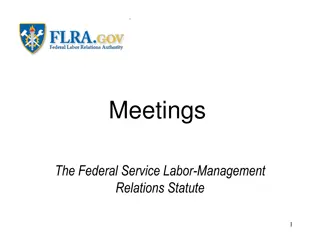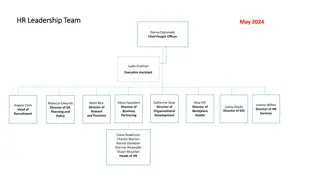Transatlantic Relations under the Biden Presidency: Continuity or Change?
Amid the tumultuous Trump presidency, transatlantic relations faced challenges with a focus on economic issues, NATO, and global engagement. The election of Joe Biden brought hope for a revival in these relations, aligning with Europe's anticipation for a renewed partnership. This article explores whether the Biden presidency will restore the previous status quo or lead to substantive changes in transatlantic dynamics.
- Transatlantic Relations
- Biden Presidency
- International Relations
- European Union
- Trump Administration
Download Presentation

Please find below an Image/Link to download the presentation.
The content on the website is provided AS IS for your information and personal use only. It may not be sold, licensed, or shared on other websites without obtaining consent from the author. Download presentation by click this link. If you encounter any issues during the download, it is possible that the publisher has removed the file from their server.
E N D
Presentation Transcript
Transatlantic Relations under the Biden Presidency Plus a Change, Plus C est la M me Chose? Dr. Sten Idris Verhoeven
Introduction Under the presidency of Donald Trump, transatlantic relations were the worst in the 20th-21stcentury, even worse than under President George W. Bush Specific issues of tension President Trump openly questioned the continued relevance of NATO Hostile towards the EU, as an actor that engages in unfair trade (e.g. 25% tariff on steel imports and a 10% tariff on aluminum imports from the EU), and supportive of Brexit Overtures to strongmen in Europe, especially Putin, but also within the EU (e.g. Victor Orban).
Introduction Yet, these specific issues resulted from a radical different view of the Trump presidency on the nature of international relations and its relation with Europe The general policy of Trump s administration is focus on a populist nationalism and unilateralism instead of global and multilateralism (the withdrawal of the Paris Agreement, the reneging of the Iran Nuclear Agreement, the undermining of the WTO dispute settlement mechanism, the purported withdrawal of the WHO, ) Rejection of the international liberal order as meaningful, instead a transactional and zero sum approach to international relations, to the benefit of the United States Rejection of the idea of the West, that despite their many differences, there are shared common values and ideals that are intrinsic to the relation between the United States and Europe After the election of Joe Biden, there is a sense of relief in European capitals and an expectation that transatlantic relations will return to the status quo ante. Is that realistic? Has the transatlantic relation changed by the Trump Presidency? Are those chances leading to the same outcome? If so, are the causes the same?
The EUs Anticipation for a Renewed Transatlantic Relation Already in 2019, at the Munich Security Conference, Biden proclaimed We will be back Not surprisingly, the election of Biden as the future president has been warmly welcomed in most European capitals and already had some effect (e.g. situation in Northern Ireland in the Brexit negotiations) The end of the Trump Presidency rapidly led the EU to adopt positions for the Transatlantic relations
The EUs Anticipation for a Renewed Transatlantic Relation Council Conclusions on EU-US relations of 7 December 2020 Importance of a renewed transatlantic relation Strategic importance of the EU s partnership with the US as the world s foremost and closest relationship Rooted in shared values and common interests, cultural and historic ties, as well as geopolitical reality Strong transatlantic partnership is vital to ensure and to contribute to our common security, stability and prosperity Transatlantic relations are the bedrock of the rules-based international order, reinforcing international peace and security, freedom, prosperity, human rights, gender equality, multilateralism, rule of law and democracy Model for the rest of the world A renewed transatlantic agenda is necessary to find joint answers to global challenges
The EUs Anticipation for a Renewed Transatlantic Relation Fields of future cooperation COVID-19 United Nations 2030 Agenda for Sustainable Development Green economic recovery and green energy The US to re-join the Paris Agreement Transatlantic climate dialogue in the run-up to COP26 Jointly implement concrete measures to fight climate change and achieve climate neutrality Digital transitions Deepening of economic relations, including settling trade differences. Reforms in international organizations, in a way that preserves the UN Charter and human rights (WHO and WTO) Global non-proliferation, disarmament and arms-control architecture Common threats and challenges against democratic societies and market economies of the presented by the growing international assertiveness of various actors Cooperation and dialogue in the area of security and defence, including through EU-NATO partnership Promoting strong people-to-people connections Cherishing the past while embracing the future
The EUs Anticipation for a Renewed Transatlantic Relation High Representative of the Union for Foreign and Security Affairs: Joint Communication to the European Parliament, the European Council and the Council (2 December 2020): A new EU-US agenda for global change Shared history, shared values and shared interests. Combined global power and influence remains unrivalled Almost 1 billion people The two largest blocs of advanced democracies A third of the world s GDP and trade and 60% of foreign direct investment Joint commitment is essential in a world where authoritarian powers seek to subvert democracies, aggressive actors try to destabilise regions and institutions, and closed economies exploit the openness our own societies depend on A new transatlantic agenda for global cooperation
The EUs Anticipation for a Renewed Transatlantic Relation The guiding principles of a new transatlantic agenda The transatlantic partnership should work to advance global common goods, providing a solid base for stronger multilateral action and institutions Support all like-minded partners to join Pursue common interests and leverage collective strength to deliver results on strategic priorities Solutions that respect our common values of fairness, openness and competition including where there are bilateral differences Covid-19 and beyond Funding for the development and equitable global distribution of vaccines, tests and treatments Develop a pandemic playbook for preparedness and response and step up cooperation and data sharing Work together to facilitate trade in essential medical goods, starting by joining the Trade and Health Initiative under the WTO Work together to reinforce the WHO and design and deliver a joint reform proposal
The EUs Anticipation for a Renewed Transatlantic Relation Environment Coordinate positions and efforts for ambitious global agreements at the UN Summits on Climate and Biodiversity Propose a new transatlantic green trade agenda, which would include a Trade and Climate Initiative within the WTO and measures to avoid carbon leakage Form a transatlantic green tech alliance to ensure greater cooperation on developing clean and circular technologies Jointly design a global regulatory framework for sustainable finance Joint efforts to lead the fight against deforestation and step up ocean protection, in particular a global plastics treaty and designate Maritime Protected Areas in the Southern Ocean
The EUs Anticipation for a Renewed Transatlantic Relation Trade and technology WTO reform efforts Create a new EU-US Trade and Technology Council to help, facilitate trade, develop compatible standards and promote innovation Transatlantic dialogue on the responsibility of online platforms and Big Tech, including, global solutions for fair taxation and market distortions in the digital economy Develop a common transatlantic approach to protecting critical technologies in light of global economic and security concerns Work on an AI Agreement and intensify cooperation to facilitate free data flow with trust Renew cooperation on regulation and standards
The EUs Anticipation for a Renewed Transatlantic Relation A safer, more prosperous and more democratic world Fundamental interest in strengthening democracy around the world Sustainable recovery, including by debt restructuring Joint promotion and protection of workers rights The strategic challenge presented by China's growing international assertiveness Challenges and opportunities in the Indo-Pacific region will help deepen cooperation with like-minded partners in the region Strategic interest in a stable and secure Middle East, North Africa and Sahel, security in the Persian Gulf, including the Iran nuclear deal, stable and prosperous Afghanistan Transatlantic cooperation on Russia Continued EU-US partnership and close coordination in the Western Balkans Coordinated approach in our relations with Turkey Engage with Latin America and the Caribbean region Joint commitment to transatlantic and international security: a structured EU-US Security and Defence Dialogue
The EUs Anticipation for a Renewed Transatlantic Relation The EU s (overly?) ambitious agenda demonstrates a longing for the past transatlantic relation, but at the same time, the EU has become more assertive, especially in the field of defence and security A united, capable and self-reliant EU is good for Europe, good for the transatlantic partnership and good for the multilateral system A stronger EU role in defence, including through supporting investment in capability development, will benefit NATO and transatlantic cooperation The EU is ready to fulfil its responsibilities, enhance its strategic autonomy and ensure better burden-sharing The EU and NATO s capability priorities should be largely aligned
Transatlantic relation under the Biden Presidency: A Complete Break? Joe Biden is a well known transatlantic, well connected within Europe Important change in tone and refocus on multilateralism Summit for Democracy, promised by Biden to be held in his first year in office Biden called climate change the existential threat and promised to immediately rejoin the Paris Agreement after taking office Likely to curb the ongoing trade war between the US and Europe, but will there be renewed negotiations on TTIP? Biden has repeatedly expressed his unwavering support for NATO, but will the US tolerate lackluster European commitments on defence? Biden shares some views of Trump on China, but is more willing to engage; this fits the EU s idea of China as negotiating partner, an economic competitor, and a systemic rival
Transatlantic relation under the Biden Presidency On the other hand, due to China s rise, Biden will have to increasingly focus on the Indo-Pacific region Hence, Europe and the EU will be expected to step up, in particular for the security of Europe and its neighbouring regions Increased role for EU in European security, the Middle East, Africa, The EU has expressed its willingness to step up, but demands more autonomy Does the EU have the tools and vision? Is its decision-making adequate for that task? Will the US accept to relinquish some of its influence? Will it accept that Europe becomes an equal partner of prefer the existing dominance? What European defence will the EU need to adopt? Germany has already dismissed the concept of European strategic autonomy of French President Macron as an illusion
The Giant Panda in the Room The renewed transatlantic relationship is not only the result of a change in US leadership and shared values (internal dynamic) Increasingly, the partnership seems to be based on shared concerns about China s assertiveness (external dynamic) Europe and the EU is asked to take more responsibility due to the US need to focus on China Internally, the EU has taken minor steps towards China s assertiveness: e.g. the adoption of the EU Foreign Investment Screening Mechanism; EU Global Human Rights Sanction Regime On the other hand, the EU considers China as a partner as well and is China s biggest trading partner and therefore does not benefit from a confrontational approach Will the EU be able to reign in a confrontational US?
Transatlantic Relations under the Biden Presidency Plus a Change, Plus C est la M me Chose? Conclusion After the Trump Presidency, the transatlantic relation has changed The US is no longer satisfied with a passive European and EU attitude in security and defence The EU has increased its calls for more autonomy and responsibility, but on its own terms, as a partner The reason is not only the Presidency of Trump, but shifting great power dynamics, in particular the rise of China However, the changes will lead to the same outcome, a different but same transatlantic relation, based on shared values and common interests, with elements of systemic competition with outsiders



